They say that getting pregnant nowadays involves a lot of effort - and a lot of tech! Thanks to inventions like ovulation apps, those who are trying to conceive can easily track when they're ovulating and most fertile to boost their chances of getting pregnant. That's why we've rounded up some of the best ovulation apps to download if you're trying for a baby.
This might seem cynical, but let's face it, most of us spent the majority of our young adult lives trying to ward off pregnancy, so when it comes to planning your perfect family, we never expect it to take very long. But trust us when we say, falling pregnant is not as easy as you might think, so don't feel too let down if there's still no positive pregnancy test after only a month or two of trying.
As well as working out your most fertile days with an ovulation calculator, something that can really improve your chances of pregnancy is a fertility app. The clever apps track your period cycle, allowing women to learn about their ovulation patterns, however irregular or late ovulation may be, and so they feel more connected to their bodies as a whole. But with so many on the market, it can be hard to know which one to try and how exactly the app can help you.
Before we begin reviewing our top list of the best ovulation apps - just a word of warning. Most of these apps ask you to log your sexual activity so that they can track how often you have sex on a weekly basis and predict how likely you are to conceive.
While this is helpful, you shouldn't let it kill the romance in your relationship. If you find yourself reaching for your phone the moment you've finished having sex, you risk compromising the intimacy and excitement in your couple. Remember to prioritise this too! There's no rush, you can always log your sexual activity the next day.
The best ovulation apps
1.
Glow
Best for period tracking
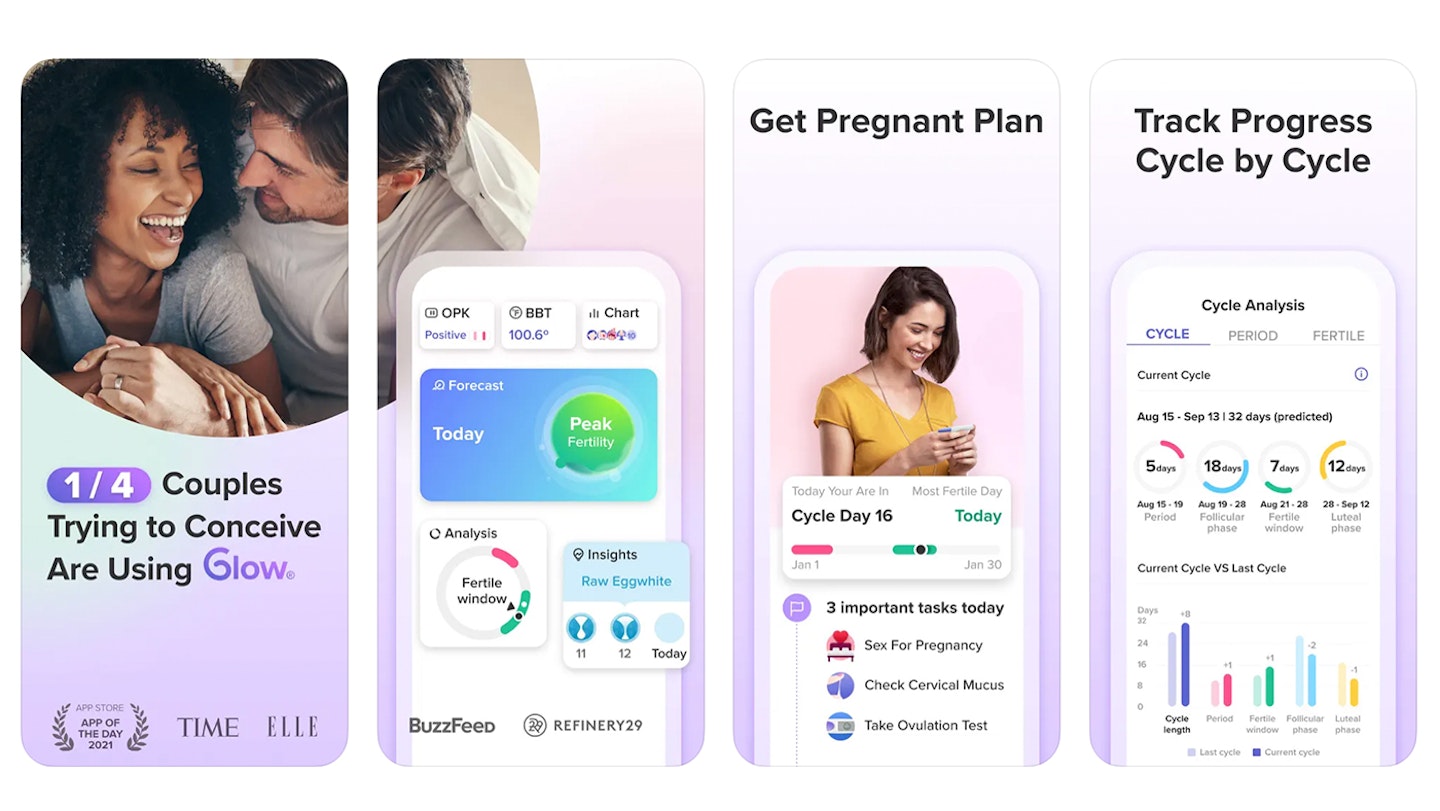 Glow app
Glow appapps.apple.com
One of the most well-known fertility apps, Glow is a free menstrual and ovulation calculator as well as a basal body temperature (BBT) chart that records your period dates, mood, symptoms, sex and medications. Uniquely, it also provides support for women undergoing fertility treatments such as IVF or IUI. The daily health log allows users to record their emotions, stress level, weight, exercise and more.
Having read a lot of reviews, we can see that the reason Glow is so popular is due to its simple, user-friendly nature. For fertility app newbies, this is a great one to start with as it spoon-feeds you all the information you need about your ovulation cycle, without requiring too much effort or taking over your life. Women report it to be useful, effective and straightforward.
What it costs: Free to download and use but you can subscribe to a premium version to unlock more features. Cost ranges from £15.49 to £59.99 premium users.
Pros
- Great for tracking symptoms each month
- Supports women going through fertility treatment such as IVF
Cons
- Some didn't find the premium version worth the money
2.
Ovia
Best for tracking symptoms
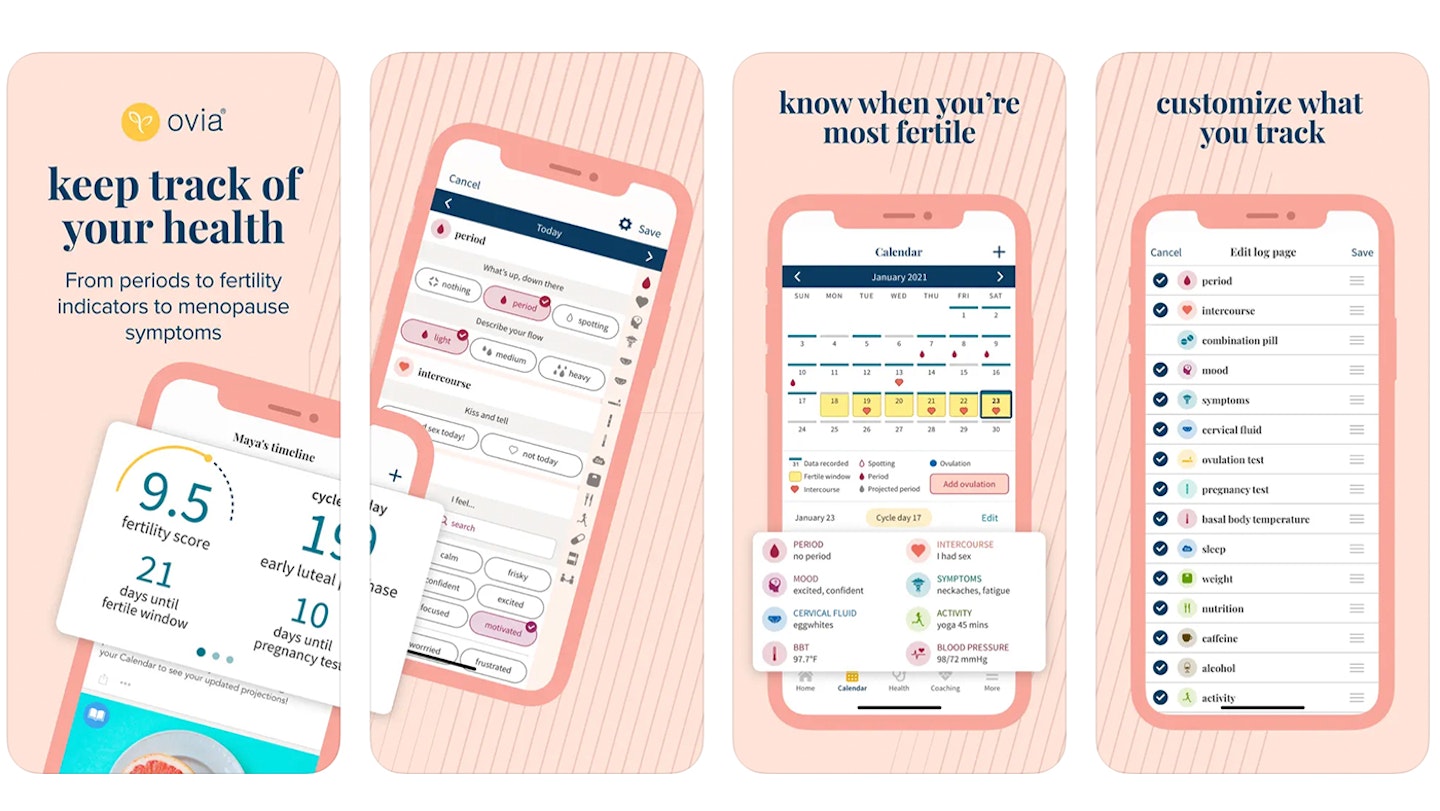 Ovia app
Ovia appapps.apple.com
Ovia was developed by Harvard scientists and claims to be the most accurate and data-driven fertility predictor app. If you’re trying to conceive, Ovia is a reliable way to go. The free app lets you record all sorts of details like your cycle type, length, how long you’ve been trying to conceive, and even cervical fluid. It gives you a fertility score between one and 10 on how likely you are to conceive on a particular day and will also tell you what your ovaries are doing, or preparing to do, at each stage in your cycle.
Ovia fertility has been praised for its precision in tracking a whole host of intimate details about its users. This includes the option to add fields for food and water intake, making baby planning even more meticulous. Ovia is great for those who monitor what they eat closely. It also tracks your blood pressure, weight and sleep cycle.
What it costs: Nothing.
Pros
- Tracks many symptoms including sleep, weight and even diet
- Clearly tells you how fertile you are on each day
Cons
- Doesn't allow you to log miscarriages
3.
Kindara
Best for using with a BBT tracker
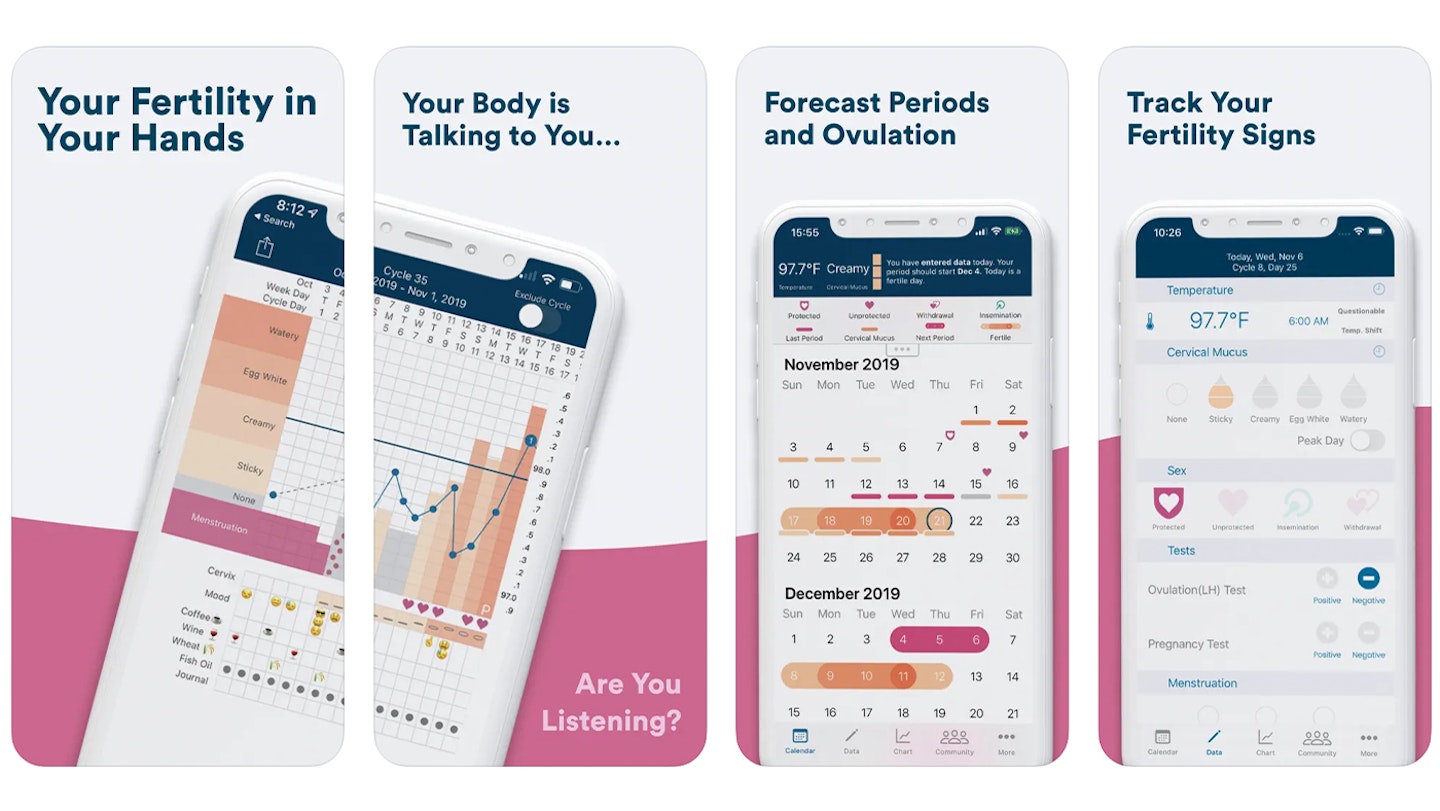 Kindara
Kindaraapps.apple.com
Kindara calls itself the “most sophisticated fertility app available.” It comes paired with a wireless basal body temperature thermometer to make charting a breeze.
Based on the fertility awareness method, Kindara is a free ovulation calculator, BBT chart and period calendar. It allows users to track their periods, when they have sex, pregnancy test results and gives them ovulation predictions. And for those looking for even more detail, you can even record cervical height, firmness and fluid. Kindara gives users the chance to create daily journal entries detailing whatever they think is relevant.
The one downside of Kindara is that it operates using a lot of charts and graphs, so if you prefer something more visually accessible, this is perhaps not the one for you. However, the real USP of Kindara is that it offers a wireless, oral fertility thermometer called Wink, that syncs with the app via Bluetooth. Whereas with other apps, you take your own temperature manually and enter it into the app, this direct method is perhaps more reliable.
What it costs: Nothing.
Pros
- Gives accurate results and works with BBT tracker
- Great for detailed symptom tracking
Cons
- Isn't the most visually accessible app as it uses graphs and charts
Best for both conception and prevention
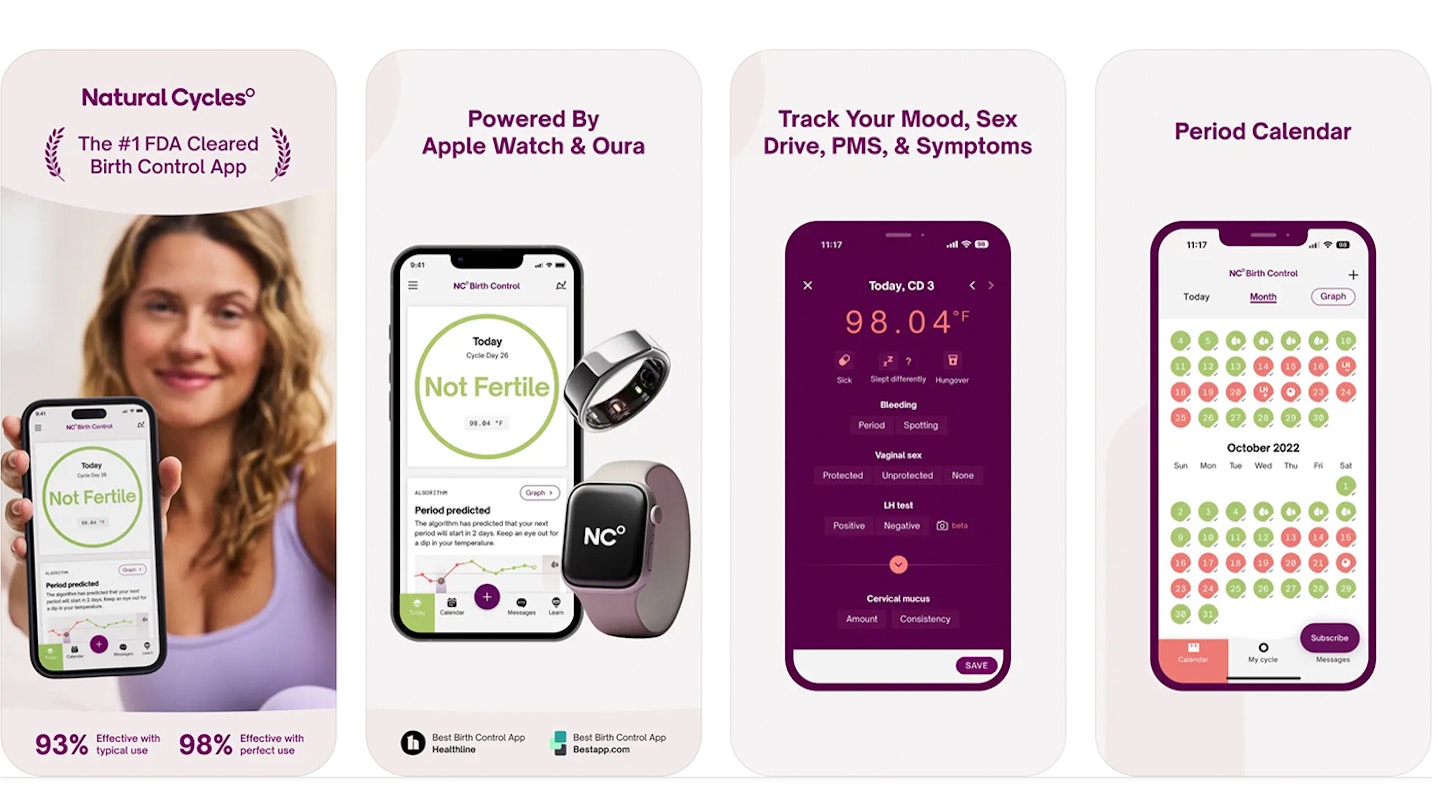 Natural cycles
Natural cyclesapps.apple.com
Natural Cycles is an app that has been widely documented in the media recently. It was founded by a married couple, Elina and Raoul, who were themselves in search of an effective method of natural contraception. It was originally created as a form of contraception but now is used by thousands of women as a tool for planning pregnancy. You can switch the settings from “Prevent” mode to “Plan”, as soon as you're ready to start trying for a baby.
Natural Cycles is a powerful fertility tool to get to know your body and truly understand how your cycle works, helping you to work out when you are at your most fertile, by tracking your basal body temperature every day. Every day it will give you a clear indication as to your fertility status - whether that's "peak fertility" or "not fertile".
It's really clear and straightforward to get your head around visually. For that reason we really like it. It's also one of the only apps that has two different modes for preventing and planning pregnancy, which is conveniently adaptable to the stage of life you find yourself.
What it costs: You can pay either £5.99 a month or £39.99 a year with an oral basal thermometer included.
Pros
- Gives you the option to prevent conception and plan for conception
- Very clear and user friendly
Cons
- Isn't free to use
5.
Clue
Best for tracking PMS symptoms
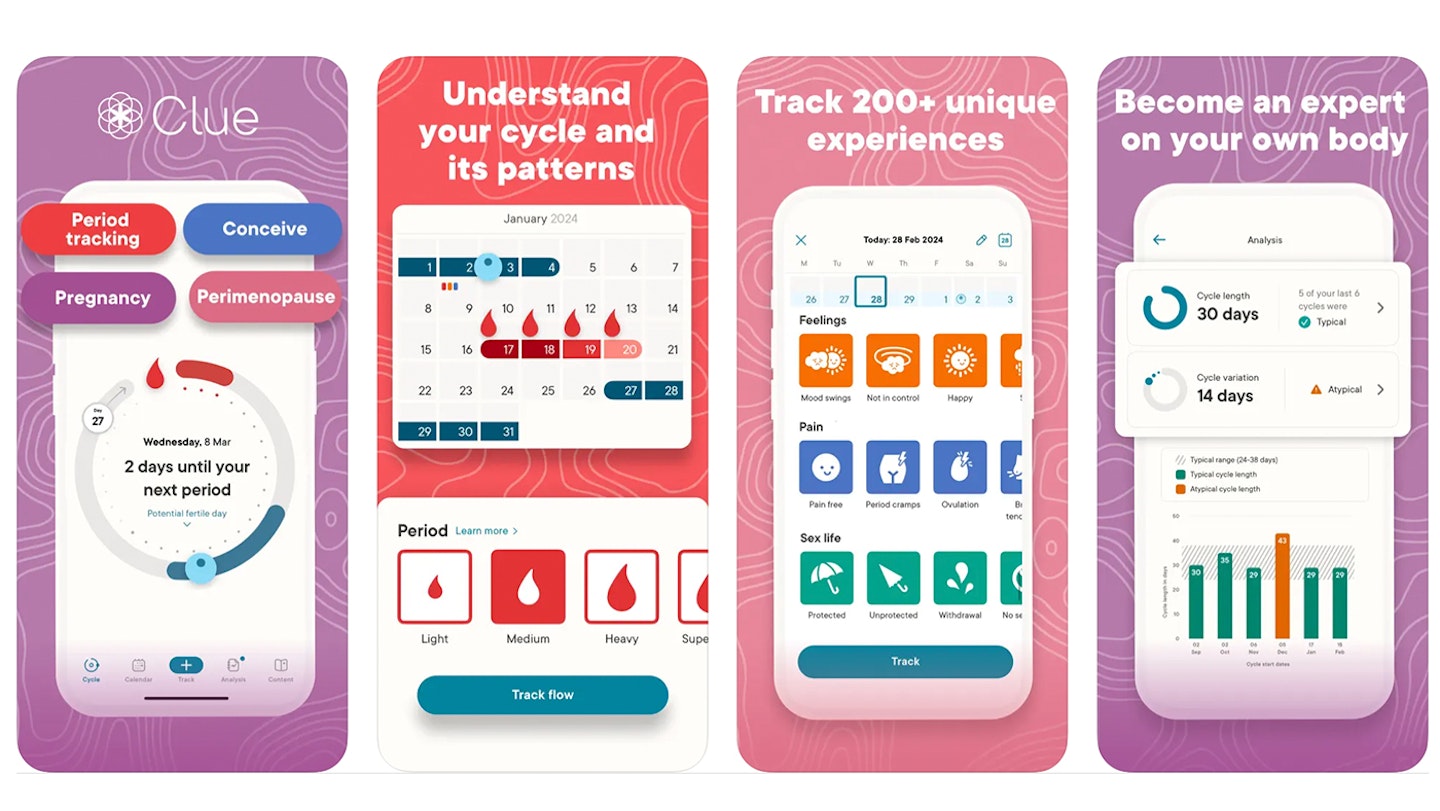 Clue app
Clue appapps.apple.com
The Clue Period tracker works to not only predict when it's that time of the month, but it also helps you understand your menstrual calendar, when you're ovulating, when you're most fertile plus has a built-in pill reminder if you decide to go back on the pill.
If you also struggle with PMS, this app tracks your symptoms too and predicts when you're most likely to feel cramps as well as how heavy your flow is likely to be like on that day. In order for it to be as accurate as possible, the app allows you to log and track just about everything during your monthly cycle so this is a great app if you also want to track your menstrual symptoms too.
What it costs: Nothing.
Pros
- Also helps track PMS
- Also has a built in pill reminder
Cons
- Doesn't allow you to log postpartum symptoms
6.
Flo
Best for getting to know your hormones and body
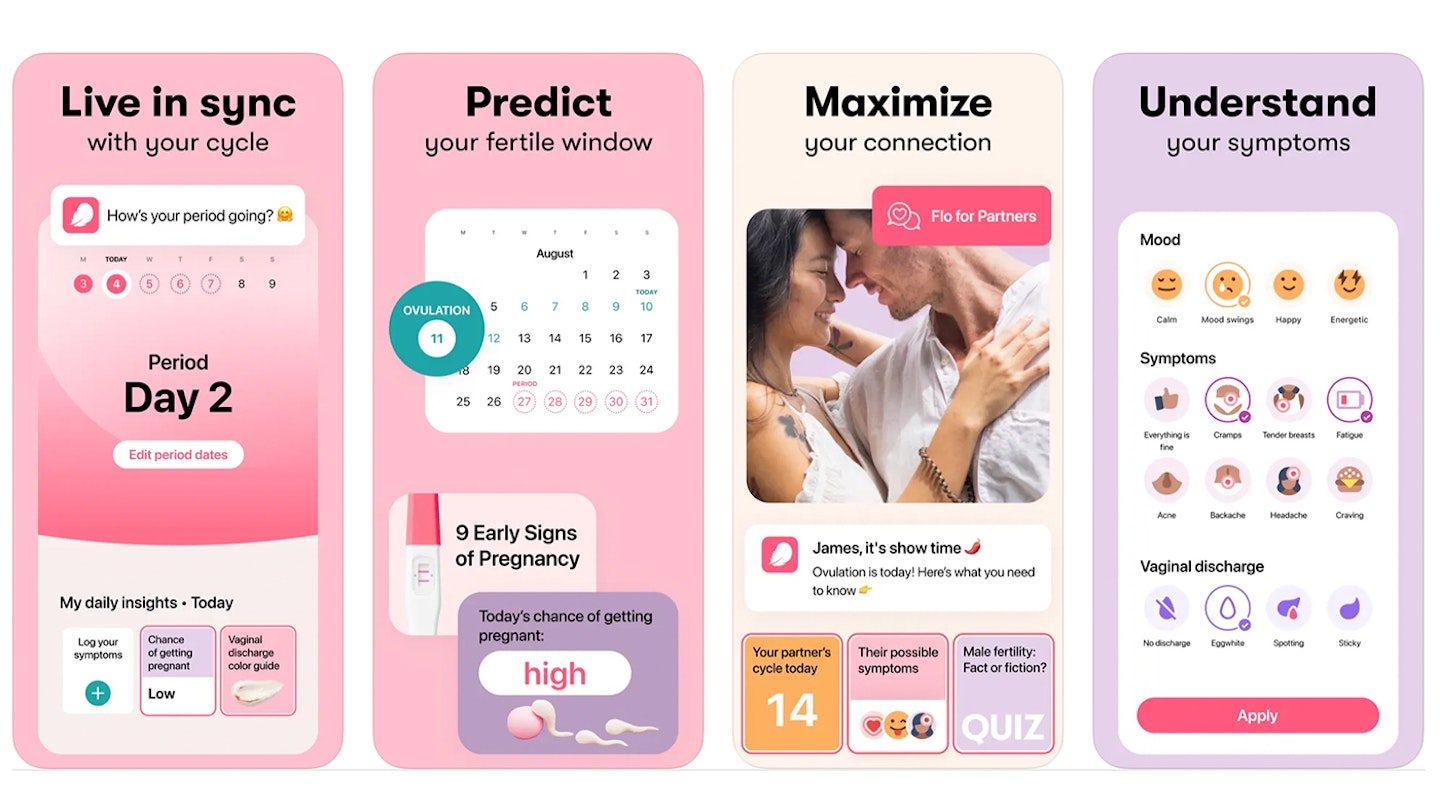 Flo
Floapps.apple.com
A popular period tracker, Flo allows you to log over 70 symptoms and activities to get the most precise period and ovulation predictions. Flo helps you to understand your body better and you can explore accurate cycle predictions and tips on how to benefit from your cycle phase and hormone levels for clearer skin, better workouts, and more energy.
You can use it beyond conception and during pregnancy too and can track your baby’s development and learn the essentials of being a parent with special visuals and articles developed by medical experts.
What it costs: Nothing however Flo offers a subscription plan that gives you a more personalised experience.
The pros and cons of ovulation tracker apps according to an expert
While they might be growing in popularity, fertility and ovulation apps have their limitations according to Dr. Amit Shah, leading gynaecologist and co-founder of Harley St clinic Fertility Plus.
Firstly, Dr Shah believes these apps can cause users to disconnect from their own bodily signals. "By focusing too much on what the app says, women might ignore or misinterpret the natural cues their bodies provide. For example, these apps may indicate when ovulation should occur, but this doesn’t necessarily mean it is happening."
Dr Shah says this can lead to missing critical signs of ovulation or other health issues. "While fertility apps can be valuable tools, they often omit crucial information about the complexities of fertility health. Many apps do not account for underlying medical conditions that can affect fertility, such as polycystic ovary syndrome (PCOS) or thyroid disorders."
Having said that, it shouldn’t be neglected that fertility tracking apps offer women unprecedented access to information about their menstrual cycles, ovulation periods and overall reproductive health. "These tools can empower users by providing insights that help them make informed decisions about conception and contraception." Says Dr Shah.
"By tracking daily symptoms, body temperature and hormonal changes, women can better understand their fertility patterns, potentially improving their chances of conceiving." Dr Shah explains.
About the expert
Dr. Amit Shah qualified for his medical degree in 1988 and achieved his Obstetrics and Gynaecology Masters degree in 1991. He was admitted as a full member of the Royal College of Obstetricians and Gynaecologists in 2004. He has since practiced as a Consultant and Clinical Lead at the Homerton Fertility Centre and has 25 years of experience working in the NHS. Mr Shah now works exclusively privately and remains involved with research and development of science. He was invited to the fellowship at the RCOG in 2016.
A journalist since 2015, Emily Gilbert is the Features & Reviews Editor for Mother&Baby and has written for the website and previously the magazine for seven years. Emily writes about everything from the top baby products to pregnancy, fertility and maternal mental health. Specialising in product reviews, Emily is the first to know about all the exciting new releases in the parenting industry.
